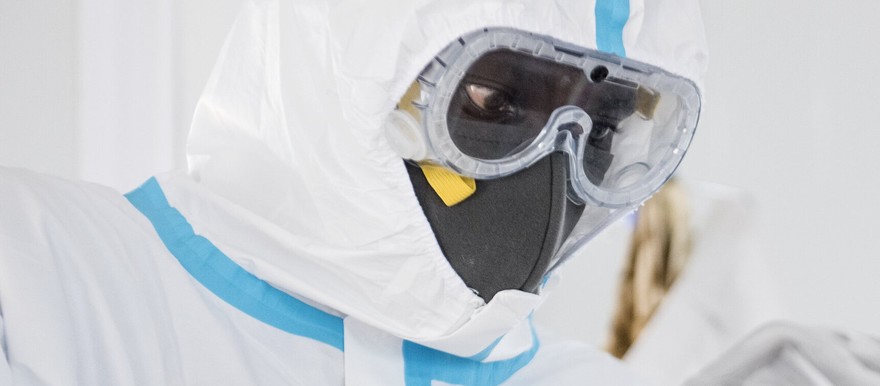Several people who plan to travel within and outside South Sudan raise concerns over delays in testing results, citing lack of Covid-19 testing machine (PCR) in the country ten’s states.
The majority of those Radio Tamazuj has interviewed from different states say delays in the return of sample results sent to Juba is creating panics in the states.
“Our concern in Bentiu is that there is no testing machine, results of samples sent to Juba return after more than 10 days after the suspect is either dead or recovered,” said Gatkuoth John, a resident in Bentiu town, Unity State. “And that is why people are reluctant in observing COVID-19 measures because no one knows their status.”
To date, South Sudan has so far reported more than 2,600 confirmed cases, and 49 deaths, while 1,438 people have recovered from the COVID-19 disease since the country announced its first case on April 5th, 2020.
Philip Anyang Ngong, a South Sudanese Human Right Advocate, said he has been disappointed by the Public Health Laboratory that test coronavirus over the delay of the result.
Anyang Ngong, a renowned rights defender who keeps travelling due to the nature of his works within and outside the country, said the delays of obtaining a COVID-19 clearance certificate caused him to cancel his flights twice.
“There is a bit of frustration in businesses. I was to travel in the second week of August to Nairobi, I booked my flight for Wednesday and I went for a test, instead, I got my results on Friday. I couldn't get my test result, so I postponed that flight,” Ngong said. “The second time it happened when I was travelling to Bor for a court session. Despite the fact there was a promise that I would get my result at the same time, which didn't happen so I postponed my flight again.”
Ngong further said, once you book a ticket, you are expected to travel within 48 hours at most but to get the result that takes forever, almost a week or 2 weeks.
“When I missed these flights, I had to go back to the agency to pay a fine of 50 dollars,” Ngong said.
Dr. Richard Laku, the COVID-19 Incident Manager, told Radio Tamazuj the current delays are due to the missing spare-parts from the COVID-19 testing machines in most parts of the country.
“The machine is supposed to be working automatically but for us, we are doing it manually because there is a spare part which is missing on our machines,” said Laku. “In a normal situation, the machine should be able to handle 96 samples in one round, which can do about 900 samples in a day. Since we are now working manually; the maximum we can reach in a day is 300 samples only.”
A Juba resident who only identified himself as Madit accused the health ministry of neglecting samples from the locals.
“I have been going to the testing site but they don’t take my samples because there are those they prioritize,” Madit said. “That means, I had to be tested and get my results if I know someone or my brothers know somebody there.”
Dr. Akway Cham, an associate professor of medicine at the University of Juba, described the current trend of the COVID-19 spreads as worrying. He said testing is crucial.
“Now, it is very challenging because we are experiencing community transmission,” said Dr Cham. “As a country, we need to move from contact tracing to massive testing. All ten states should each have a testing centre to reduce the backlog in Juba.”
Dr. Laku told Radio Tamazuj the health authority has already extended testing machines to most of the ten states: Torit, Yambio, Aweil, Rumbek, Wau, Bor and Abyei.
“We are left with a few states like Upper Nile and two administrative areas,” Laku said.
Domach Thomas, who recently recovered from COVID-19, told Radio Tamazuj that it took him a week to get his result back in June.
“A patient will suffer from stress,” Thomas said. “My sample was taken on 3 June, and I was informed about my positive status on 10. As a medical professional, these delays are not good.”
The health professional said the delays of results might have been due to congestion of samples. He added people should follow guidelines from health authorities. Thomas urged the government to at least boost its capacity of testing across the country.
However, health official Dr. Laku said those delays were due to the time when the country only had one testing machine in Juba.
“We have passed that stage. Yes, it used to happen when we had only one testing machine but now the result takes only 24 to 48 hours,” he said.
Anyang Ngong, the South Sudanese human rights advocate, cautioned the Ministry of Health to be responsible with the donations coming from foreign and humanitarian agencies in response to COVID-19 pandemic in the country.
“The Ministry of Health has become very inefficient for reasons that we don't know. Chinese and Egyptians have given us materials; we have had enough money from agencies to support the centres but if there is still inefficiency up to now after 6 to 7 months down the line then where was the money for COVID-19 going? Where is the facility going? If they are there, what is happening, the results are not coming out at the right time,” Ngong said. “The Ministry of Health should be questioned.”




